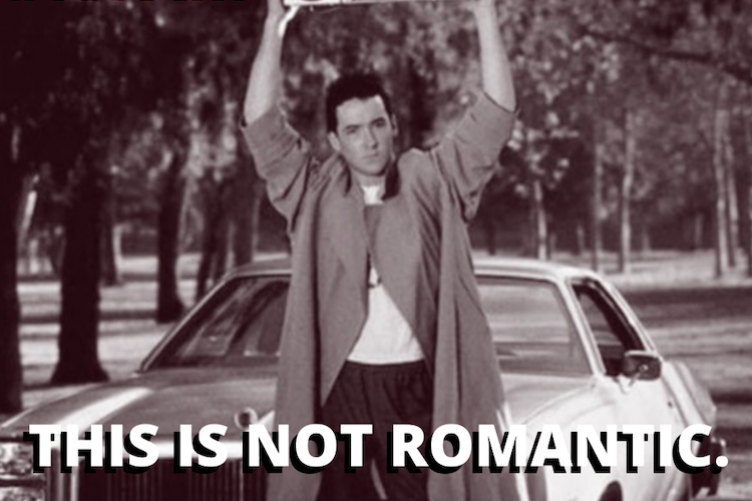
Stalking. It’s a classic trope that can be traced back to classic Hollywood films: boy meets girl, girl rejects boy, boy just sees this as “playing hard to get.” So he follows her around, continues to ask her out, plays music outside of her window, lies in order to get closer to her. And finally after his relentless pursuit, she finally gives in. Because in the romantic comedy universe, “no” doesn’t mean “no,” it’s simply flirtation encouraging the boy to try harder: “convince me.” If he just shows her how much he likes her, she will eventually come to her senses and give in.
Real love isn’t like this, but media is trying to teach us that it is. According to a study by Julia Lippman of the University of Michigan, stalking behaviors are made to seem normal or even romantic in television and film by making them a crucial part of romance. Instead of being portrayed as threatening, stalking is framed as a sign of unequivocal love. “Indeed, they may be seen as reflecting one of the great cultural myths of romantic love: that no matter how big the obstacle, love will conquer all,” Lippman writes.
You may be thinking of romantic comedies of the distant past, like Say Anything, 10 Things I Hate About You, Revenge of the Nerds, Groundhog Day. But we need to come to terms with the fact that some of our favorite modern television shows and films feature stalkers. How about Jim from The Office (relentlessly pursues Pam, even though she is engaged), James from The End of the F*cking World (follows Alyssa “to protect her”), Stranger Things’ Jonathan Byers (creeps outside of Nancy’s boyfriend’s house and takes photos of her) AND Lucas Sinclair (stalks Max until she talks to him), Edward from Twilight (watches Bella sleep), or Scott Pilgrim (“he stalked her until she left the party”)?
It is important to note that all of the above examples are men stalking women, the most common heteronormative trope in movies and TV. But occasionally in media we will see a woman stalking a man, or stalking within LGBTQ+ relationships. But when it comes to non-male stalkers, their behavior comes off creepy or obsessive. The most recent example might be Ingrid in Ingrid Goes West, who displays an anxiety-inducing number of stalking behaviors to win over a social media influencer, Taylor, who in the end turns her down and calls her out for being a creepy stalker.
We love to love these characters. We even try to defend their behavior, and that is pop culture’s intention: though it may be concerning on paper, and this behavior often resembles one of a movie villain, in the end it is a good thing these people did follow their victims around, because eventually, love wins and happy ending ensues. Or we just ignore the creepiness altogether.
But all of the characters above perfectly fit the profile of a stalker: they track their victims whereabouts using various means, they follow their victim and show up wherever they are, they send unwanted gifts or messages, they drive by the victim’s house/apartment/workplace...do I have to go on?
Maybe the Onion sums it up best with the headline “Romantic-Comedy Behavior Gets Real-Life Man Arrested.”
January is national stalking awareness month, and SHARPP is engaging the UNH campus on stalking: what are the signs, how can you help someone who is being stalked, and what can you do if you are being stalked? Take a closer look at the TV shows and films you are consuming: do the characters display signs of stalkers or abusers?
If you want to know more about stalking, visit us this Tuesday, Jan. 28 and Thursday, Jan. 30 12:30pm-2pm in the MUB union court, or visit our website. Our Law & Order SVU discussion series on February 3rd at 6pm in McConnell 220 will also be themed around stalking. If you or a friend is experiencing stalking, do not hesitate to reach out for help from SHARPP. We have walk-in office hours M-F 8am-4pm, or call us anytime at our 24/7 crisis line: (603)-862-7233.
-
Written By:
Jordyn Haime '20 | SHARPP Student Marketing and Communications Assistant














































